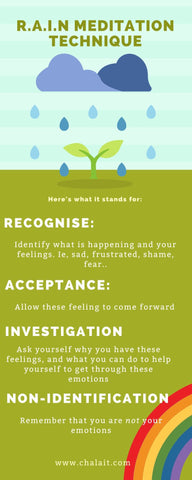The meditation techniques when you are finding it impossible to meditate
As scientific research continues on meditation, the rewards and benefits of this ancient practice continue to unfurl. For something so simple, it is amazing to learn just how beneficial meditation is to our body, mind and wellbeing.
Read: The science of meditation, are the benefits real?
Can't find the time to meditate? Here's what to do instead
In this fast-paced world where news is updated at the refresh of a browser page, it is difficult to opt-out for a quiet block of time to meditate, despite the wealth of health benefits. After all, not only do we have to face a full working day, we need to fit in exercise, food preparation and quality family time.
Walking Meditation
Despite what it sounds like, walking meditation is not about roaming the streets with your eyes closed in a trance-like state. This style of meditation focuses on your gait and rhythm of movement as opposed to your breath.
A guided walking meditation audio track can help reduce distractions and set the tone for successful meditation. These are available on meditation apps such as Headspace and even on YouTube
Guided Sleep Meditation
If your brain suddenly creates a list of everything you've forgotten to do as soon as your head hits the pillow making it difficult to fall to sleep, then a guided sleep meditation might be the night-time saviour for you.
There are many guided sleep meditation clips on You-Tube. The clips general begin by bringing attention to your body, making you aware of each body part and then relaxing them one-by-one until each muscle is in a quiet calm.
Be mindful instead
If you are struggling to find time to do it all, including fitting in a regular meditation practice - try being mindful instead. Remembering to be in the moment is a wonderful tool to help ground yourself when you are feeling stressed, overwhelmed or to learn to be more present with family.
One popular mindfulness tool when you are full of emotion is the R.A.I.N practice, helping to identify feelings of overwhelm and obsessive thinking and put aside to refocus your brain to be in the current moment. The acronym stands for the following
- Recognize: Identity what is happening and your feelings around this. Name how you are feeling ie, I am feeling overwhelmed, sad, shame, fear....
- Acceptance. Allow the feelings to come to you, giving yourself compassion and acceptance
- Investigation. Ask yourself why you have these feelings and what you can do to help yourself through this time.
- Non-Identification, or natural awareness. Remembering that you are not your emotions.
Can't switch off your brain when meditating? Here's what you should do
For others, it is not a matter of time, but more the inability to shut off their noisy brains. In the past, this has been an obstacle for myself and it only because of my perseverance that I have the confidence to continue meditating. After all, meditation is a form of brain-training, teaching your mind to quiet itself.
For some, meditation can be scary. Without the normal distractions of devices, Netflix and work you may be forced to confront emotions that are bubbling inside of you. If emotions are a stumbling block you may want to start with R.A.I.N, as mentioned above.
Meditate in bite-size chunks
Start your meditative practice in small doses that last for as little as three minutes. Even short sessions will give you benefits such as reduced fogginess, reducing anxiety, better sleep and a better frame of mind.
Try a guided meditation
Guided meditations are very effective, and perfect for people who have noisy brains. Guided meditations can be short and swift, or lengthy and are available in a wide range of formats, including a class, a CD, an app and on YouTube. This form of meditation is ideal as the instructor's voice will continually bring your wandering mind back to the meditation.
Improve focus
Ultimately, meditation is about achieving calm in your mind so that you have greater focus and day. For centuries Monks have used Matcha to aid in achieving mental clarity and zen. L-theanine is an active compound found in Matcha, one which helps to improve attention and also brain function.
The ritual of preparing Matcha tea is also thought to be meditative. If you are finding it difficult to squeeze in time for meditative practice and switch off your noisy brain then perhaps try carving out a moment to quietly prepare some matcha tea and drink it.
Meditation resources that will help
New apps, websites and YouTube clips will help you to get into a meditative state. Meditation apps will give you so many types of guided meditations to choose from, some that are suitable for seating and using at work and others to help you sleep. These apps may even offer you gentle reminders to take a moment to practice.
You may even get inspiration by following some meditation experts or yogis on Instagram or Facebook.



